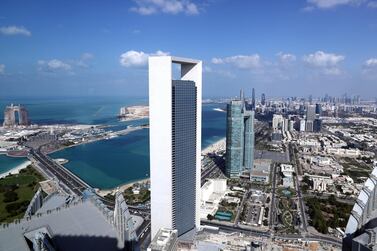Despite the challenges the world faces during the Covid-19 pandemic, Abu Dhabi National Oil Company hosted a virtual summit that brought together chief executives of global oil and gas companies, who expressed optimism over the recovery of the energy industry, as economies open up and energy prices rebound.
The chief executives of BP, Total, Aramco, CNPC, Eni were among the top energy leaders who convened virtually at the fifth Abu Dhabi CEO Roundtable on Tuesday, hosted by Adnoc group chief executive and UAE minister of state, Dr Sultan Al Jaber.
The global energy industry has been battered by the coronavirus pandemic, registering historic lows in terms of prices as well as demand, forcing systemic changes in the way Big Oil runs business.

Earlier this week for instance, BP wrote off $17.5 billion (Dh64bn) off the value of oil and gas assets and announced it was laying off 10,000 workers as it adapted to the changing reality of the energy industry.
Its chief executive, Bernard Looney remained optimistic about the industry’s future.
“I do think the response has probably been a bit quicker than we expected. I think that’s a good thing,” he told delegates.
"As ever, we don’t know what the future holds, we really don’t know. And while I’m optimistic about it, I’m only optimistic because we are very focused on the things we control – getting our business in shape,” he added.
Oil majors such as Shell have also announced write-downs of $2bn, while others such as Chevron stated $10bn in impairment charges.
In March, French major Total, lowered its capital expenditure by more than $3bn as prices fell to $30 per barrel. Still, Patrick Pouyanne, its chief executive remained bullish over the pick-up in demand as countries ease lockdown measures.
"I would say in Europe today we are more optimistic because we are getting out of the lockdown and honestly in our industry, the consumption of energy is going up quite quickly, quicker to normal than expected by all,” Mr Pouyanne told delegates.
Power supply, which fell 20 per cent during the lockdown in France was up to “normal market levels”.
"In our fuels business, we are still not at standard levels, but demand is coming back quite quickly,” he said.
In its latest monthly oil market report the International Energy Agency said the recovery in prices to $40 per barrel levels indicates that the worst for the oil markets is over.
While the agency expects demand to decline by 8.1 million barrels per day - the steepest in history - the IEA sees a tepid recovery of 5.7m bpd in 2021.
China, the earliest to enforce strict lockdown measures, which led to a virtual standstill of its factory activity has begun to increase oil imports. Crude imports reached an all time high of 15 per cent in May as Beijing looks to revive economic activity.
Dai Houliang, the chairman of China National Petroleum Corporation urged "international co-operation" to meet the risks and challenges facing industry.
Dr Al Jaber said open dialogue among top industry leaders can lead to a sustainable economic recovery.
“As we respond to the challenges of Covid-19, each one of us has had to guide our respective organisations through difficult times," he said.
"The roundtable offered an excellent platform to share valuable lessons on how to ensure the safety of our people, the resilience of our business, and the long-term growth of our industry,” Dr Al Jaber added.
The next edition of the roundtable will be held in November.








